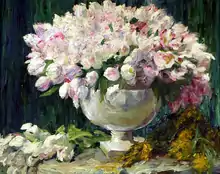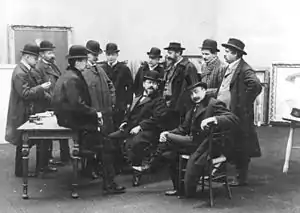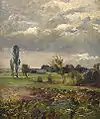George Mosson
George Mosson (2 February 1851 – 3 September 1933,[1] was a Franco-German painter and draftsman,[2] founding member of the artists' association Berliner Secession.[1][3] He was mainly known for his paintings of still lives representing flowers,[2] but he also painted landscapes[2] and portraits.

Career

Mosson was born in 1851 in Aix-en-Provence,[1] in the south of France. He emigrated to Berlin at the age of 14, where he finished his schooling. His artistic training began with studies at the Academy of Arts, Berlin, with professors Carl Steffeck and Hermann Freese. He continued his studies at the Weimar Saxon Grand Ducal Art School, and began to exhibit his works in Berlin in 1884.
In 1892, Mosson was co-founder of the Vereinigung der XI collective as well as founding member of the Berliner Secession association,[1][3] grouped together to protest against the conservatism of the "Association of Berlin Artists". After the split of this group in 1913, Mosson joined forces with Max Liebermann, Max Slevogt and others to form the Free Secession. He was also a member of the Union of German Artists ("Deutschen Künstlerbundes").
Mosson died on September 3, 1933 in Berlin.[1]
Paintings

Märkische Landschaft, 1915 
Intérieur avec table couverte et verres de champagne, fruits et asters de Chine, 1919 
Nature morte d'amaryllis, 1928
References
- George Mosson, natune.net
- April 2012 – Vorstellung der Künstlerin Augusta von Zitzewitz, Galerie "der Panther"
- Katalog der XXVL Ausstellung der Berliner Secession, 1913, archive.org
Bibliography
- Rudolf Pfefferkorn (1972). Die Berliner Secession; Eine Epoche deutscher Kunstgeschichte (in German). Berlin: Haude & Spenersche Verlagsbuchhandlung. ISBN 3-7759-0150-7.
External links
| Wikimedia Commons has media related to George Mosson. |
- George Mosson, Artnet.
- George Mosson, Mutualart.